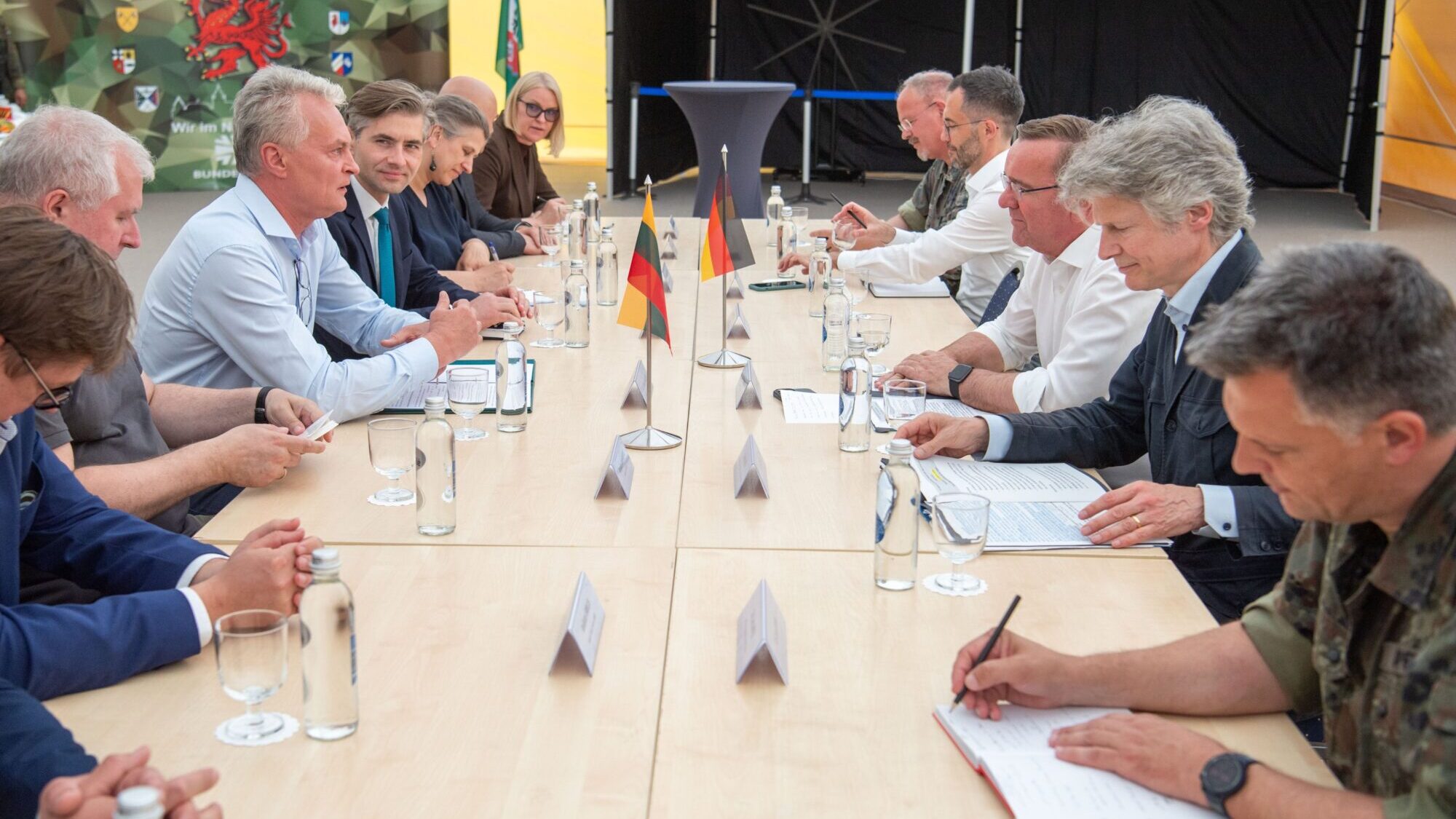
Lithuanian President Gitanas Nausėda (center left) discussing the deployment of German troops with Defense Minister Boris Pistorius (center right).
Berlin is preparing to permanently deploy 4,000 troops in Lithuania, German Defense Minister Boris Pistorius confirmed during a press conference in Vilnius on Monday, June 26th. But first, new infrastructure will need to be built to accommodate the German troops, Deutsche Welle reported on Monday.
“Germany is ready to permanently station a robust brigade in Lithuania,” Pistorius said, before drawing historical parallels between West Germany before 1990 and the Baltic states today, located on the peripheries of the Atlantic alliance.
“We as the Federal Republic of Germany commit ourselves explicitly to our responsibility and our obligation, as a NATO member state and as the largest economy in Europe, to stand up for the protection of the eastern flank,” the minister underlined.
🇩🇪 ist bereit, eine robuste Brigade dauerhaft in #Litauen zu stationieren. Voraussetzung sind eine entsprechende Infrastruktur, zum Beispiel Kasernen, und eine flexible Kompatibilität mit der #NATO-Planung, so Minister #Pistorius in seinem Statement. pic.twitter.com/kpI07nzLVp
— Verteidigungsministerium (@BMVg_Bundeswehr) June 26, 2023
Ever since the outbreak of the war in Ukraine, Vilnius has been requesting a significant increase of NATO’s already existing military presence in the country, which until now consisted of one reinforced battlegroup of around 1,000 troops, led by Germany.
Berlin has been reluctant to officially answer these calls for over a year, until now. The decision to deploy troops in Lithuania—which borders Belarus and Russia’s Kaliningrad enclave—has bipartisan support in the Bundestag, backed by both the governing coalition and the main opposition block.
However, new infrastructure and training facilities need to be constructed before any troops are relocated, Pistorius noted. Furthermore, the details of any actual troop movements will have to be ultimately approved and coordinated by SACEUR, the European high command of NATO.
“SACEUR has certain interests and very important interests, too,” the defense minister said, “so we said he has to have the possibility to maintain military flexibility at the Eastern flank.”
Along with Secretary General Jens Stoltenberg and Lithuanian President Gitanas Nausėda, Pistorius also visited the NATO troops currently engaged in a large-scale exercise in the country, called “Griffin Storm.” The drills are also led by Germany, which transferred over 1,000 troops and 300 tanks to take part. The exercise will wrap up on July 7th, less than a week before the upcoming NATO Summit in Vilnius starts.
Visited Pabrade training area for the joint exercise of 🇱🇹& 🇩🇪 troops „Griffin Storm“, with #NATO Secretary General @JensStoltenberg & DefMin Boris Pistorius.
— Gitanas Nausėda (@GitanasNauseda) June 26, 2023
Strong proof of 🇩🇪 readiness to assign and quickly redeploy combat units to perform tasks in 🇱🇹.#StrongerTogether! pic.twitter.com/BF1Jd96Bli
With the recent developments in Russia, Lithuania has gained even greater strategic importance. Wagner PMC’s coup attempt and managing its fallout will likely be among the most important talking points of the summit, especially given that Wagner could be regrouping in neighboring Belarus soon, which, according to President Nauseda, “may become an additional factor.”
However, the German defense ministry denied that the decision to deploy troops was influenced by the coup attempt. “The planning that is starting now is to be seen solely with the preparations of the Vilnius summit and is not linked to the events of the past weekend,” a ministry spokesman said.
